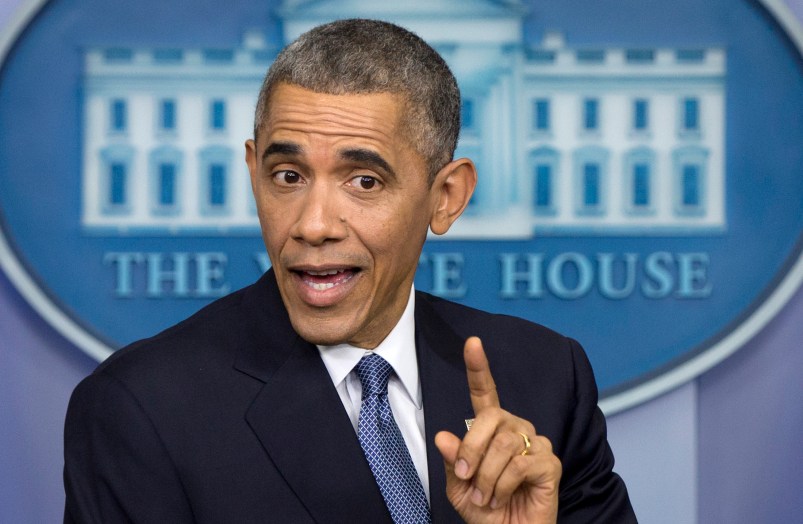When House Republicans signaled last week that they would provoke a fight over Social Security in the next two years, progressive stalwarts like Ohio Sen. Sherrod Brown and Massachusetts Sen. Elizabeth Warren decried the action, with Brown alleging the GOP wanted to “set the stage to cut benefits for seniors and disabled Americans.”
But notably silent on the Republican stance, which prevents what has been a routine transfer of revenue between the retirement and disability funds, upping the chances of a crisis for the latter in late 2016, was the Democratic official who might actually be at the table if conservatives succeed in forcing negotiations in the next Congress: President Barack Obama.
TPM asked multiple times last week for the White House’s position on the House action, but never received a formal response, a stark contrast to the loud public pronouncements of Brown, Warren, and others. It also invokes the uneasy relationship between the White House and Social Security advocates, who were dismayed by Obama’s willingness to accept cuts to the program during the 2011 grand bargain talks with House Speaker John Boehner (R-OH).
“Advocates do not trust the president on Social Security,” Monique Morrissey, an economist at the left-leaning Economic Policy Institute, told TPM last week. “If he blinks and they message this right, it could be something.”
Nancy Altman, co-director of Social Security Works, told TPM that while the Obama administration “hasn’t been great on this issue,” she sees encouraging signs in Obama’s recent appetite for confrontation on issues like immigration.
“Our hope is that he’ll be that way on Social Security, too,” she said. “But if you look at past history, you can’t be confident that that’s what will happen.”
There are echoes of the broader discord within the Democratic Party as it assumes its minority status in Congress. Progressives are trying to reassert influence within the party, while the White House has to deal with the governing reality that the legislative branch of government is controlled by Republicans. It’s a dynamic that could lead to friction between the Obama administration and its ostensible Hill allies on a number of issues. Social Security might be one.
But advocates’ distrust of Obama is also founded in recent history. As was widely reported at the time, Obama was willing to put Social Security cuts on the table in exchange for new revenue in 2011 as he and Boehner sought a big financial deal ahead of the pending debt-ceiling deadline.
During the 2012 election, Obama’s campaign said that he is “committed to keeping the promise of guaranteed Social Security benefits for current and future generations.”
After the election, Obama’s FY 2014 budget proposal would have cut Social Security in exchange for tax revenues, a plan that Dan Adcock, policy director of the National Committee to Preserve Social Security and Medicare, told TPM had “troubled” his group.
Obama took those cuts out of his FY 2015 budget, but groups wary of the changes to the program that Republicans might pursue in the next two years seem aware that they’ll need a robust response to counter any new proposals.
“An important part of the advocacy that we’ll do over the next couple years is trying to ensure that all the important players, including the White House, understand why it’s important not to cut benefits,” Adcock said. “We’re not going to leave any stone uncovered.”
Adcock said that the “silver lining” of the House GOP’s move was it could galvanize support, not only from progressive members, but also the public. “It shows our grassroots … what the intentions are,” he said.
Conversely, though, Republicans might be emboldened knowing that Obama has expressed an openness to reforms before. On the other side of the Capitol, Senate Majority Leader Mitch McConnell (R-KY) signaled last week his caucus had big ambitions.
“The truth is we could work for bigger things too,” he said. “We could work together to save and strengthen Medicare, to protect Social Security for future generations, to balance the budget and put our growing national debt on a path to elimination.”










I bet Darcy and UnfadingGreen are pissed that they can’t comment on this article.
And, as their first order of business the right wants to “reform” a government program that brings elderly Americans out of poverty and provides them with dignity, while showing a ongoing surplus.
In other news, the sun is still hot.
never trust Obama on anything economic, unless its to always side with the richest americans. remember Obama resided over the biggest transfer of wealth from the middle class and poor to the rich in American history.
He’s repeatedly made it clear he wants The Grand Bargain to cut Social Security and Medicare. Now he has the cover of a Republican Congress that’s hell bent on doing that.
No one “resides over” something, least of all the President - the term is “presides over.”